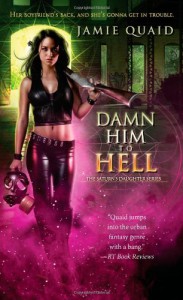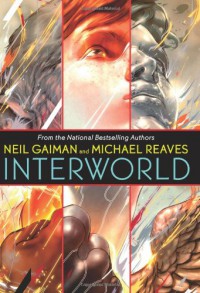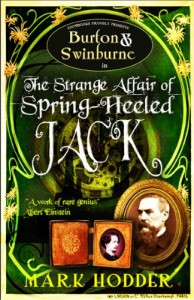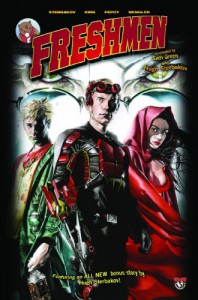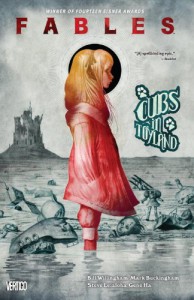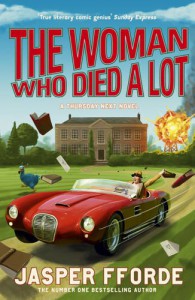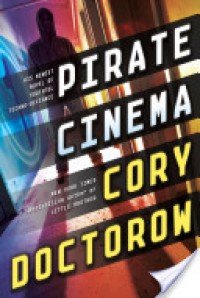THE BLOODY NINE! - Red Country by Joe Abercrombie
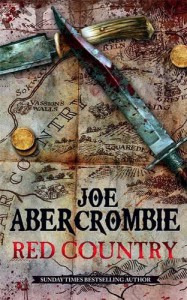
Red Country
There isn’t really much to say except: if you liked the First Law trilogy, you NEED to read Red Country. I really could stop at saying just this: THE BLOODY NINE!
Just like this. Completely devoid of context. That should be intriguing enough for anyone familiar with the name to pick this up. I guess that everyone has already, though. I was late to pick up Red Country. For reasons. Then again, it wouldn’t be fair to neglect mentioning some of the fantastic stuff Abercrombie has woven into his latest tale.
I was a bit reluctant to read this. Well, not really, because I could not really conceive of Abercrombie failing to entertain. But I wasn’t thrilled at seeing Red Country marketed as a Western. Back when I was a child and watched everything that on on the four channels we received, I loved me some good (translation: awfully cheesy) “cowboys and Indians” stories, always rooting for the oppressed (in my view always the Indians), always close to tears when on of the horses were hurt. Bit those times are long past and I’ve lost my taste for dry, dusty Westerns.
Still, Red Country drew me right in. I picked it up with the intention to read a few pages and then check out another book in the to-read pile to determine what I might be in the mood for and 200 pages later I got up to get a glass of water, the other books completely forgotten, but my throat parched as I tracked along with the Fellowship through the endless country I search of a new future, unfathomable riches, and great adventures.
I strongly believe that Abercrombie’s magic is encapsulated in the dialogue, besides the general, all-pervading snark. He paints a deft picture, the world building and character development and all the other cornerstones of supposedly good story telling are aptly attended to, but it’s the characters’ conversations (and their internal monologues – and dialogues - in equal measure) that make the characters come to life before my mind’s eyes. Of course, if the characters were bland or one-dimensional that wouldn’t be an easy feat to accomplish, but Abercrombie has those covered as well. He just knows how to make you feel and hope for them despite their inevitable flaws, how to turn your expectations upside down to suddenly root for a character you hadn’t taken much stock in up to then or to wish for the demise of one you had ranked among your favourites until a moment ago.
So, when we first meet Shy South, she doesn’t strike as a particularly lovable heroine. Her treatment of Lamb, their relation being undefined at that time, doesn’t much endear her either. But there might be a history to her attitude, so let’s read on. And yes, I get it, it’s a hard land, it’s a hard life, it hardens the people who try to wrestle a living from it in more than one sense. Maybe we’ll get to see a softer core in time…
When Shy and Lamb discover that while they were trading in town their farm has been burnt down, their farmhand/friend hanged, and Shy’s two much younger siblings kidnapped, the tale gains steam, turns into a veritable whirlwind as they pick up the kidnappers’ trail and decide to follow it with a never-wavering determination to get the kids back. Not a whirlwind n the sense that it’s super action-packed, one battle following another (though there are quite a number of battles, skirmishes, duels etc fought in the incomparable Abercrombie style). But what appears to be a slow track across the Near and Far Country, is filled to the brim with revelations (mostly for the attentive reader/fan), confrontations, betrayals, alliances, encounters with enemies new and old, and the forging of unlikely friendships.
Red Country is always intense. It’s (almost) always funny (if you like the snarky tone as much as I do), even in its gruesome scenes. There are some breathtaking moments when you find yourself clenching your fists and your jaws whishing for the protagonists to find a way to persevere.
In a way, it’s also a book on economical well-being. I’m sure there’s a thing or two to learn from Shy South, if you’re inclined to be ruthless. Kidding, she’s only looking out for herself and hers and manages to do a good dead and help others in the bargain. A veritable heroine after all.
I swiftly read my way through the novel and reached the very satisfying ending thoroughly entertained and with the desire to revisit the First Law trilogy, Best Served Cold, and The Heroes.
 1
1
 1
1

